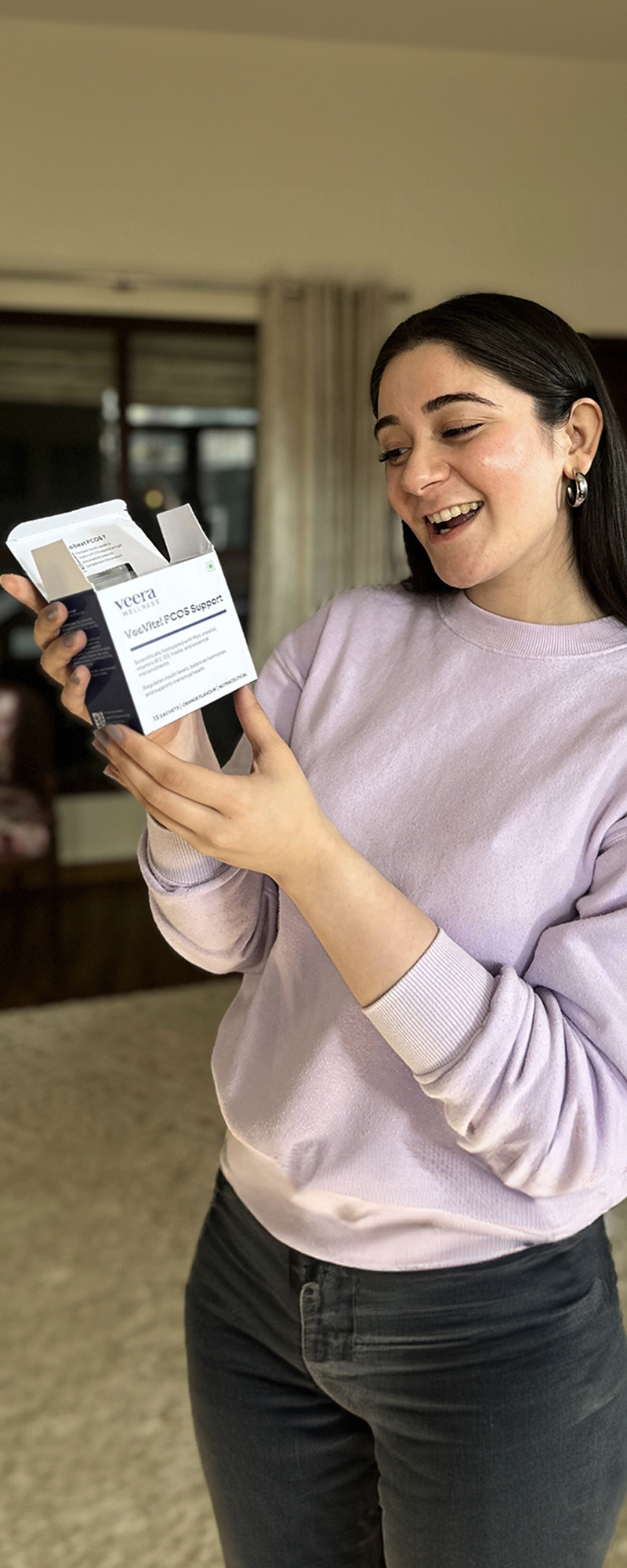Though medication for hormonal balance can assist, libido is still influenced by social and psychological factors. Addressing depression effectively is crucial, and seeking appropriate mental health support can be beneficial. Engaging in regular exercise not only reduces depression but also boosts serotonin and endorphin levels, potentially enhancing libido. Combining exercise with dietary adjustments can aid in managing insulin, weight, and ultimately hormone levels. It’s advisable to consult with a nutritionist, therapist, or physician to address these concerns effectively.
Understanding Polycystic Ovary Syndrome
Polycystic ovaries are typically characterized by multiple small follicles of size 2-10 mm in the ovaries. These follicles are immature sacs where eggs mature. In PCOS, these sacs frequently fail to release eggs, resulting in a lack of ovulation. The exact prevalence of PCOS is challenging to ascertain, but it is believed to be highly prevalent, affecting approximately 1 in 5 women. Interestingly, over half of these affected women remain asymptomatic.
A Brief Overview of Low Libido
Experiencing fluctuations in your sex drive is a normal aspect of life, occurring not only over the years but even from day to day. Changes in hormone levels and various life events can influence whether your sex drive reaches peaks or declines as you age. While the shift in libido may not be immediately noticeable when you enter different stages of life, factors impacting it tend to manifest gradually from your 20s onward. Here’s further insight into understanding these changes in libido.
Your sex drive, also known as libido, encompasses your desire for sexual activity, and its complexity persists at any age. Numerous factors, encompassing both biological and psychological realms, shape your inclination towards sex regardless of your age. Sex hormones like testosterone, estrogen, and progesterone—ubiquitous among all individuals—significantly influence desire, arousal, and orgasm. With aging, these hormone levels naturally decline, potentially contributing to a diminished sex drive.
No standardized libido level exists throughout the aging process, and hormonal changes alone do not solely dictate libido. Other influential factors may include:
– Anxiety and depression
– Certain medications, such as antidepressants, birth control pills, and blood pressure medication
– Chronic conditions like chronic kidney disease or diabetes
– Illness
– Menstrual cycle
– Parenthood
– Relationship issues
The Connection Between PCOS and Sex Drive
Various research indicates that women with PCOS tend to experience reduced feelings of sexual attractiveness and desire. Factors such as high BMI and hirsutism can influence an individual’s perception of sexual attractiveness. While this study did not find a significant impact of BMI on overall sexual function scores, higher BMI levels were associated with lower scores in the desire and satisfaction domains. A pilot study conducted by Ferraresi’s SR on Changes in sexual function among women with polycystic ovary syndrome demonstrated that obese women with PCOS were more prone to sexual dysfunction and lower FSFI scores, regardless of their obesity status. Furthermore, Dale W. Stovall’s study revealed a significant decrease in the orgasm subdomain with increasing BMI.
The reality is that there is a tangible link between PCOS and diminished libido which, can be influenced by a multitude of factors:
-
Hormonal Imbalances:
Elevated levels of androgens in females may not necessarily translate to heightened sexual desire. An overall hormonal imbalance, including the ratio of androgens to estrogen and progesterone, can have the opposite effect, leading to female sexual dysfunction and a decline in libido.
-
Menstrual Irregularities:
The irregular menstrual cycles and anovulation characteristic of PCOS can disrupt hormonal fluctuations throughout the menstrual cycle. Fluctuations in estrogen and progesterone levels, coupled with irregular ovulation, may contribute to decreased sexual desire.
-
Body Image Concerns:
Certain physical manifestations of PCOS, such as hirsutism, acne, and fluctuations in weight, can impact body image and self-esteem. This can affect comfort levels and confidence in intimate situations, thereby influencing changes in libido.
-
Psychological Distress:
Coping with PCOS symptoms, concerns regarding fertility, and potential impacts on self-esteem can lead to psychological stress and anxiety. The uncertainty, particularly for those attempting to conceive, can become burdensome. Research even suggests that the interplay of physical symptoms, hormonal imbalances, and fertility concerns may increase the risk of depression and anxiety among women with PCOS. Mental health significantly influences sexual function in women, with emotionally stressed individuals often experiencing decreased libido.
-
Medications and Treatments:
Certain medications used to manage PCOS symptoms, such as hormonal contraceptives or anti-androgen medications, may have side effects that affect sexual desire. Additionally, factors unrelated to PCOS, such as relationship dynamics, stress, or other health conditions, can also impact sexual desire.
Tips To Improve Your Libido
Sex-related hormones, including estrogen and estrogen-like compounds, exert an influence on sexual desire in females. During menopause, when estrogen levels decline, many women may encounter a decrease in libido and sexual functioning. Estrogen replacement therapy might offer relief for some individuals.
Vaginal dryness is another common symptom of menopause. Certain types of birth control pills may also have a dampening effect on libido. If individuals suspect that their hormonal contraception is impacting their sex drive, consulting with a doctor about switching pill types is advisable.
-
Address Anxiety
High levels of anxiety commonly act as barriers to sexual functioning and libido for both males and females. This anxiety may stem from general life stressors or specific concerns related to sex.
Individuals burdened with demanding work schedules, caregiving responsibilities, or other stressors may experience fatigue, leading to diminished sexual desire. Moreover, anxiety and stress can hinder erectile function, discouraging engagement in sexual activity. Research from a 2017 review on erectile dysfunction in young men suggests that depression and anxiety contribute to reduced libido and increased sexual dysfunction.
To manage anxiety and enhance mental well-being, individuals can take various steps, including:
– Practising good sleep hygiene
– Engaging in favorite hobbies
– Regular exercise
– Maintaining a nutritious diet
– Improving interpersonal relationships
– Seeking support from a therapist
-
Foster Relationship Quality
Periods of decreased sexual desire and frequency often occur within relationships, particularly over time or when individuals perceive relationship issues. Prioritizing relationship improvement can bolster each partner’s libido. Strategies may include:
– Planning regular date nights
– Participating in shared activities outside the bedroom
– Practising open communication
– Allocating quality time for each other
-
Emphasize Foreplay
Enhancing sexual experiences can heighten sexual desire, thus boosting libido. Increased focus on touching, kissing, incorporating sex toys, and oral sex, often termed as outercourse, can enrich sexual encounters. For women, foreplay may be particularly significant, as research indicates that clitoral stimulation is essential for a significant portion of women to achieve orgasm.
-
Prioritize Quality Sleep
Adequate sleep not only enhances mood and energy levels but may also impact libido. Research suggests that women who obtain more sleep experience increased sexual desire. Additionally, longer average sleep durations are associated with improved genital arousal compared to shorter sleep durations.
-
Adopt a Nutritious Diet
A balanced diet can positively influence libido by promoting cardiovascular health and circulation while mitigating factors that may diminish libido. Conditions such as metabolic syndrome, cardiovascular disease, and polycystic ovarian syndrome can adversely affect hormone levels and libido. Consuming a diet abundant in vegetables, low in sugar, and rich in lean proteins can help prevent disorders that impair libido.
-
Consider Herbal Remedies
While limited research exists on the efficacy of herbal remedies in enhancing sexual function, some individuals may find them beneficial. Emerging data suggests potential benefits from herbal remedies such as maca, Tribulus, ginkgo biloba, and ginseng. However, caution is advised, as herbal products may interact with medications and are not regulated by the FDA for safety and quality.
-
Engage in Regular Exercise
Regular exercise offers numerous benefits for libido. A study on men undergoing androgen deprivation therapy found that exercise helped alleviate body image concerns, low libido, and relationship changes.
-
Maintain a Moderate Weight
Overweight and obesity are associated with low sex drive and reduced fertility, possibly due to hormonal factors like low testosterone concentrations. Maintaining a moderate body weight through a balanced diet and regular exercise can enhance libido and overall energy levels.
-
Explore Sex Therapy
Sexual desire is multifaceted, involving both psychological and physical components. Even with physical conditions impacting libido, such as diabetes, addressing emotional and psychological responses to sex through sex therapy can improve libido and sexual functioning.
Consult Veera’s Doctors
When encountering low libido the immediate professional often considered is a gynecologist. Occasionally, a decreased sex drive may result from excessive pain in the vaginal region. Such discomfort could stem from bacterial or fungal vaginal infections, such as chlamydia, gonorrhea, or bacterial vaginosis. Doctors here at Veera Health not only are equipped to help you manage your PCOS but also can guide you towards better mental health which is another reason behind low libido.
Learn More With Veera
Consistently making targeted lifestyle changes can not only help alleviate symptoms but also reduce the risk of low libido. For personalized support and expert care from a knowledgeable team specializing in PCOS, explore Veera Health’s dedicated PCOS program!




















